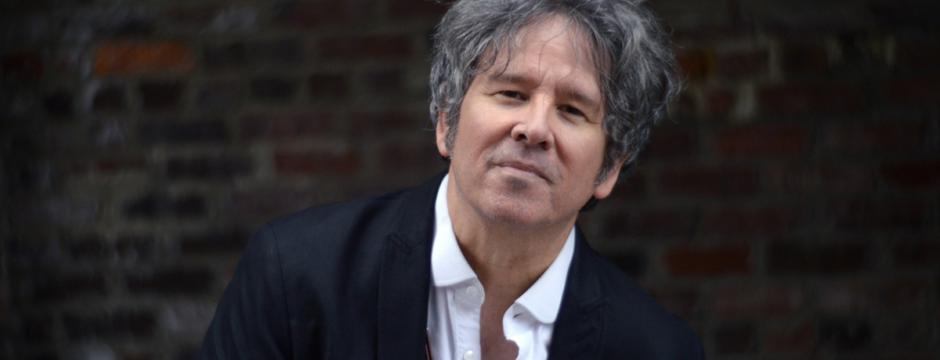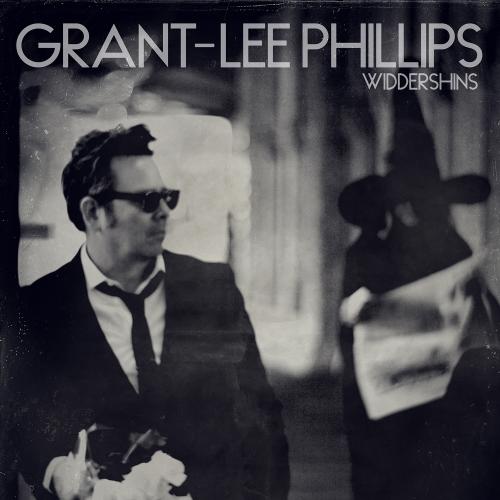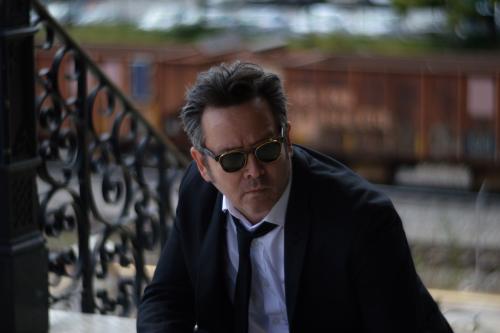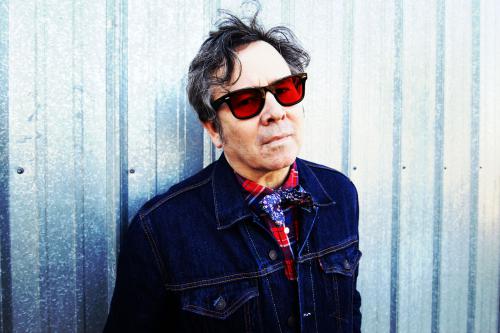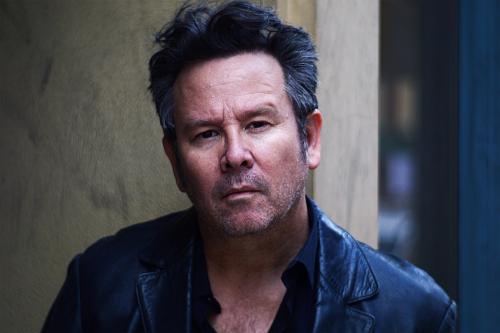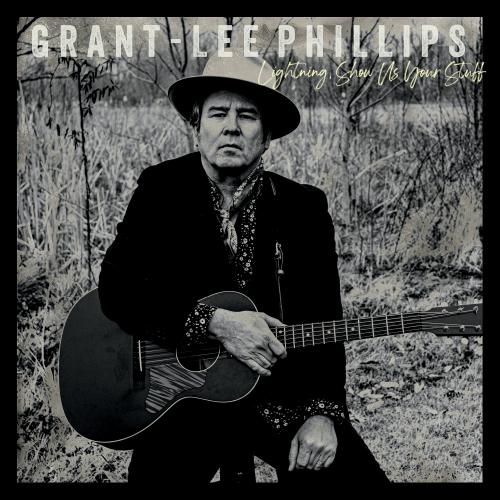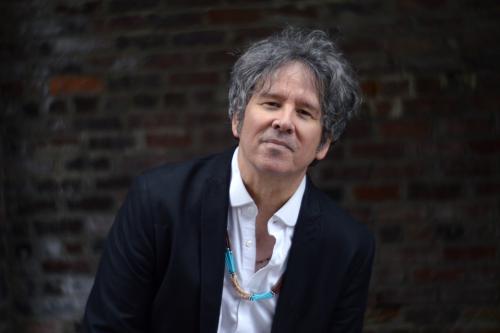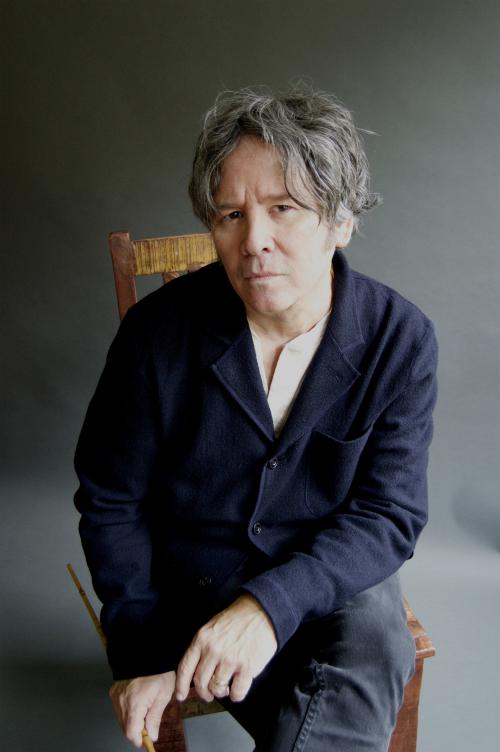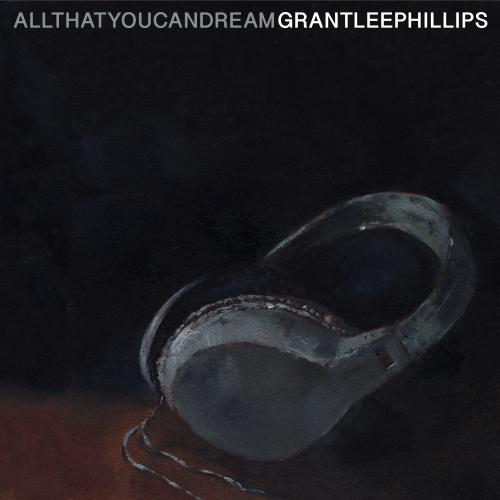Band: Grant Lee Phillips
Album: All That You Can Dream
VÖ: 20.05.2022
Label: Yep Roc/ Bertus Musikvertrieb GmbH
Website: https://www.grantleephillips.com/
When you're a musician used to a certain creative groove, it's disorienting to have this rhythm disrupted. But that was just the position Grant-Lee Phillips found himself in spring 2020: Months before the release of a new full-length, Lightning, Show Us Your Stuff — an album he was already previewing on an early 2020 tour with John Doe and Kristin Hersh — the pandemic led to the cancellation of tour dates and other promotional plans.
Like many musicians, Phillips sought out silver linings wherever he could find them. He started performing weekly at-home livestreams, dubbed Live from the Parlor, and promoted Lightning, Show Us Your Stuff from his house in Nashville. But in early 2021, when Phillips realized any potential touring options were still on hold for the foreseeable future, he started to write and record a new solo album at home. "I found respite in the process when I could do little else," he says. "It became a sort of meditation on this time in my life and the events that we've collectively experienced."
The resulting full-length, All That You Can Dream, is understandably introspective, as it's anchored by Phillips' empathetic voice and rich acoustic guitar. The album's lyrics attempt to make sense of an uncertain, anxiety-riddled time, while coming to terms with the idea that once-unshakeable things now seem fragile or fallible. "In terms of subject matter, I found that the circumstances of being off the road, and left to reflect on what this time feels like, produced a different kind of song," Phillips says. "I wasn't entirely certain—and to be honest, I'm still not altogether certain—when I get to take these songs on the road. In some ways, that freed me up to write and record the kind of song that was personal and executed as though it were for an audience of myself alone. That's freeing."
Nevertheless, writing at home was admittedly an adjustment for Phillips, who was used to the solitude of songwriting while on the road. However, he still found inspiration in movement — he and his family took daily drives in the serene Tennessee countryside, marveling at turkey vultures and haphazard hay rolls — even as his songwriting turned toward global current events. "By and large, most of what you hear is me reacting to everything that we've gone through in this year, alone," Phillips says. "The attack on the Capitol, making our way through this pandemic, and everything else."
By coincidence, he found that some of the older songs he was working up for the album had similar thematic immediacy. The string-buoyed "A Sudden Place," written in 2019 following the burning of the Notre Dame Cathedral, speaks to how quickly unshakeable monuments can crumble. The solemn, piano-driven "My Eyes Have Seen," meanwhile, references the inhumane ways immigrants and asylum-seekers were treated at the southern border during the Trump administration, a troubling development that's still not rectified.
"The only way that I know how to write is filtering whatever's coming in from the outside from the social stimulus, and the direct personal stimulation of family and whatever's going on internally," Phillips says. "All of that gets thrown into the blender. We bring our work home with us and we bring our politics home with us—even if we never get the opportunity to leave home."
All That You Can Dream is also rife with Phillips' signature songwriting flourish: using rich historical references to illuminate modern truths. "I'm always juxtaposing the events that we're all going through with similar events in history—sometimes laying one over the other to draw a comparison, to find parallels, to seek out patterns," Phillips says. As an example, he cites the "Rats in a Barrel," an unsparing condemnation of the January 6 insurrection at the Capitol Building with a specific nod to historical turmoil ("Old Lincoln saw it all go down/Almost looked like the first time ‘round").
The album-closing "All by Heart" also cautions against historical complacency: "In our memories / We seek to find some meaning in the past / But do not think, for once / That grief is buried in the grass." And the title track speaks to the idea that, as time has shown us, not everyone benefits from progress and forward motion. "All of us are engaged in a collective dream," Phillips says. "In this dream, we have a choice between a world that’s hospitable or one that’s brutal. We face a struggle between the visionary and the cynical. In this way, there’s a dual meaning in 'All That You Can Dream'—the possibility of betterment or the inevitably of collapse."
In a nod to this lyrical elegance, All That You Can Dream's music is ornate but spare. Phillips wrote and arranged the album's songs on guitar or piano, adding a basic rhythmic and vocal framework. To flesh out the music's contours, he then enlisted a pair of trusted previous collaborators, the Los Angeles-based bassist Jennifer Condos and drummer Jay Bellerose. "They were going stir-crazy themselves and welcomed the idea of a long-distance recording project," Phillips says. Bellerose set up drums in his living room, Condos served as engineer, and the duo laid down rhythm tracks to songs Phillips had sent over, as if the three musicians were all in the same room.
"I know that I have to bring my A-game when I work with them," Phillips says. "That's a personal thing where I feel like I don't want to bring them my sketches—I want to bring them something that I feel really strongly about. I know they'll be very respectful, and they'll inspire me as well."
Indeed, these songs inspired Phillips to layer on additional textures himself—for example, mellotron or pump organ—or enlist outside musicians to add keyboards, pedal steel or cello. "This more gradual kind of production allowed me to ruminate on the songs, to arrange parts for strings or keys," he says. "While working at home imposed some restrictions, it pushed me to take the wheel as an engineer, mixer and producer. Consequently, so many nuances remain in the final mix, all the weird stuff that sometimes gets lost in the polishing stages of production."
Audiences first discovered Phillips' thoughtful, literate songwriting in context of the rock band Grant Lee Buffalo, a trio which found success with the 1993 debut Fuzzy. The title track catapulted the group to international recognition. Grant Lee Buffalo followed up Fuzzy with 1994's Mighty Joe Moon (an album featuring the modern rock hit "Mockingbirds") and two more well-received full-lengths, 1996’s Copperopolis and 1998's Jubilee. Beginning with his 2000 solo debut Ladies' Love Oracle, Phillips opened another chapter in his career, as a folk- and Americana-focused artist crafting songs and stories rich with details and humanity.
During the pandemic lockdown, he also started diving into another creative endeavor: painting. One example of his artwork, as seen on the All That You Can Dream's cover, depicts a well-loved pair of headphones spray-painted silver. Phillips has kept the pair for nearly 30 years; in fact, he wore them in photographs included in Mighty Joe Moon's booklet. To Phillips, the artwork signifies not just All That You Can Dream's interior vibe, but his own meditative past few years.
"My wife said the album is very dreamlike, and feels very internal and personal," he says. "It's the kind of record where when we were growing up, we probably would have enjoyed listening to it on headphones, going within ourselves. In some ways, maybe I was taking inventory of the arc of my work up to this point. There's more to come, but I was taking a moment to reflect back on that person who I was."
Maintaining this sturdy through-line between the past and present gives Phillips' music emotional heft. All That You Can Dream is no exception. "I'm driven by the potential of making a connection," he says. "Finding that place where the listener is able to engage by way of their own experience and what I'm bringing to the table. We’ve experienced some staggering events over the last year or so. When people speak of those things, it's not enough to simply highlight or underline the headlines of the day. The aim is to tap into the feelings that we share that are trapped beneath our skin—and figure out how we expel those feelings by talking about them."
Vorherige Infos:
Album: Lightning, Show Us Your Stuff
VÖ: 04.09.2020
Label: Yep Roc/ Bertus Musikvertrieb GmbH
Website: https://www.grantleephillips.com/
“Come on lightning, show us your stuff. The words of my young daughter, as she thrust a manzanita branch toward the night sky. Kids being kids, I figured…then I heard the thunderclap.”
Grant-Lee Phillips’ latest album, Lightning, Show Us Your Stuff, is a turbulent and highly musical rumination that finds the veteran singer-songwriter addressing the strange fragility of life. His tenth solo release bears the markings of his prolific output, a melodic prowess and an ear for lyric in everyday conversation.
The album offers a salve to a wounded world, struggling to regain equilibrium. This is Grant-Lee Phillips at his most reflective, wrestling with the most pertinent of questions. What we value, how we define security, our vulnerability – here Phillips takes stock of the deeper questions with intensity and humor.
56-year-old Phillips wryly proclaims, “‘Ain’t Done Yet.’” He still has plenty to say and “more dreaming left to do.” Commenting on some of the new tracks he says, “There’s definitely a questioning - I notice it on my more direct or confessional songs like ’Mourning Dove.’ I think about the people we are when we come into the world, how we get beat up along the way and sometimes corrupted in pursuit of some brass ring. As the line goes, the things we chase that can’t be kept.” He continues, “I’ll admit it’s that nagging tendency to question everything that inspires a song like ‘Drawing the Head’ and even when I’m writing through the voice of a character, as I am with ’Straight to the Ground.’”
His last work, Widdershins, reflected the recent and radical shift in the American social climate - a world turned upside down. “I’ve tackled some of this head-on at times, addressing the inequities of this country, trying to get a few jabs in. Ultimately, I came back to the most interesting and fertile topic - our vulnerability and the scars we have to share with one another.”
Lightning, Show Us Your Stuff is grown from the same rich soil that Phillip’s long career, from Grant Lee Buffalo to his solo work has sprang from. The result is a beautifully human musical tapestry. The warm, live on the floor, instrumental bed is the perfect support for Phillips’ inimitable voice. This spontaneous approach has become a tradition among his solo works.
This record is supported by peerless drummer, Jay Bellerose (whose many credits include Raising Sand by Alison Krauss and Robert Plant) and bassist Jennifer Condos (heard on Bruce Springsteen’s The Ghost of Tom Joad and other classics). On pedal-steel, Eric Heywood (Son Volt, The Jayhawks, Joe Henry) lends impressionistic touches (Son Volt, The Jayhawks and Joe Henry). LA session musician Danny T. Levin voices a symphony of unusual horns; the euphonium, trombonium and coronet punctuates the tracks, ”Leave a Light On,” “Sometimes You Wake Up in Charleston” and the album opener, “Ain’t Done Yet.”
Phillips sums up his inspiration, “These days, I’m interested in writing about the quiet lives of people who are wrestling to hang on, trying to retain dignity, fighting back forces beyond their control. Ultimately, so much is out of our control. Confronting our dependence on one another can sometimes leave us feeling uneasy and yet we are inseparably linked. Music reminds of us of our connection to each other and I remain in awe of it. I’m not interested in pinning the songs down or reducing their mystery. I’m attempting to capture a sliver of time.”
Infos zum vorherigen Album:
Band: Grant-Lee Phillips
Album: Widdershins
VÖ: 23.02.2018
Label: Yep Roc / Bertus Musikvertrieb GmbH
Website: www.grantleephillips.com
“I’m drawing on the urgency of the moment,” reflects Grant-Lee Phillips. “The things that eat away in the late hours…”
With Widdershins, Phillips invests the insight, nuance, and wit that has distinguished his songcraft over the past three decades in a riveting dissection of today’s fraught social landscape. Beneath the moment’s tumultuous veneer, Phillips uncovers resonances spanning centuries – patterns echoing from the present day to the distant past. In doing so, he unearths deep reserves of hope and even humor, transcending shock to reveal age-old cycles and archetypes – which Phillips delights in resurrecting.
Phillips explains. “I made a commitment to myself not to sink into despair: I’m tracing a longer narrative here. We’ve been through some of this before – not just our country, but the civilization as a whole…”
The urgency that first spurred Phillips informs Widdershins both lyrically and musically, as its twelve songs arrive in a headlong rush, with the sharp trio of Phillips (guitar, vocals, keyboards), Jerry Roe (drums), and Lex Price (bass) serving as messengers. Recording live in the studio – with all of Phillips’s vocals sung while cutting basic tracks – emphasizes the clarity and prescience of the material. Says Phillips, “This moment is explosive, volatile, and heightened. It’s important to me that the music reflect that – not just lyrically, but how it wallops you over the head. It should convey that same spirit of revolt, upheaval, and absurdity.”
The album’s title – meaning to proceed counterclockwise – emerged from the buoyant, surging opener “Walk in Circles,” which throws down the gauntlet on the record’s frontline. “St. Augustine said the wicked walk in circles,” muses Phillips, “and I thought, I have no problem with that. Sign me up with the witches then, if that means moving in step with nature – but let’s not go backwards.”
From there commences a rogue’s gallery of charlatans, tyrants, and seers; a travelogue of manipulations, mannerisms, and misdeeds. “The Wilderness” examines our hair-trigger default to tribal divisions – that fatal tendency within us to cast out the other, making them the target of our fear and derision. Crowds also play a part in the satirical “Unruly Mobs,” in which Marie Antoinette condescendingly looks down upon the rabble proletariat, her playful disdain blinding her to the imminent tumult surrounding her. Phillips assumes the title role on “King of Catastrophe.” Choking back anxiety while thumbing the pages of history, he sings “It’s not as though we’re helpless and it has to be,” he sings. “They left a couple notes behind – they built a wall in Germany.” He describes the rollicking “Miss Betsy” as “a parlor song about the horrors of child labor. The character is essentially a wicked stepmother, a cruel headmistress – with just a hint of Mrs. Robinson tossed in for melodic pleasure.”
Phillips’s explorations reach a fever pitch on the terse, driving “Scared Stiff.” “I wrote that so quickly,” he recalls. “One sitting, in a sweat, thinking about intimidation, people feeling up against a wall.” Humor pervades, as the song nicked its title from a vintage Jerry Lewis and Dean Martin horror/comedy.
By turns sardonic, provocative, and illuminating, Widdershins delivers its poetic truths in Phillips’s peerless melodic sensibilities, relayed via vocal performances that balance intensity and vulnerability. Consistent with his many albums, Phillips presides over the production of the album. “By the time it’s done, I will have walked every inch of the album,” he says, “surveyed every alcove, crawled up in the attic. I approach being my own producer with the seriousness of a builder – just as I would if I were producing someone else.” Basic tracks were recorded over four days with engineer Mike Stankiewicz at Sound Emporium in Nashville. “He was so fast. We flew through songs and Mike never missed a beat or a button. I took it all home, added a few more brush strokes, but I knew we had something special when I left Sound Emporium.”
While this is the second album recorded with the Roe/Price rhythm section, it marks the first collaboration between producer Phillips and Widdershins mixer Tucker Martine (case/lang/veirs, My Morning Jacket, Bill Frisell, the Decemberists, Punch Brothers, etc.) “I’ve wanted to work with Tucker for a long time,” says Phillips. “It was clear that we spoke the same language and had comparable sensibilities.” For instance, when starting work on the backhanded salute “Totally You Gunslinger,” Phillips suggested they aim for a mix that combined Roy Orbison with The Smiths. “Somehow that made as much sense to him as it did to me.”
Grant-Lee Phillips’s gifts for reconciling classic touchstones with an adventurous sensibility has distinguished his work since he first emerged as the frontman of the acclaimed trio Grant Lee Buffalo in the early ‘90s. At once cinematic in scope and disarmingly intimate, the band’s music set the table for a varied, captivating solo career that embraced electronic soundscapes (Mobilize, 2001), reimagined country-rock (Virginia Creeper, 2004), faced fatherhood (Little Moon, 2009), delved into his own native American heritage (Walking in the Green Corn, 2012), and reflected upon his own life-changing move from Los Angeles to Nashville (The Narrows, 2016). Whether fronting a band or performing solo, he is a riveting live performer – which many discovered through his role as the town troubadour on the cult television hit The Gilmore Girls (both in its original run and the 2016 continuation).
Phillips sees in Widdershins a connection to his earliest work with Grant Lee Buffalo. “That was also a time of intense social anxiety. The Gulf War, the LA riots – everything became cranked up. Then a few years later there was the earthquake we lived through, which also made for a time of uneasiness. I was in a heightened state when I wrote that stuff – as I am now.”
As the past and present converge and the journey of Grant-Lee Phillips continues, his craftsmanship continues to blossom. In times of tumult, he awakens comfort and hope by shining light into darker corners. “I hope to express my faith in people, my faith in the good ideas we’re capable of, and that regardless of what opposition we face, the fact that we can surmount these things,” he concludes. “We can stare them down, laugh at them, belittle them, and drive the darkness back into a hole. Music is a way of kicking some of these giants out at the knees – along with a bit of gallows humor: All the noose that’s fit to print…”
